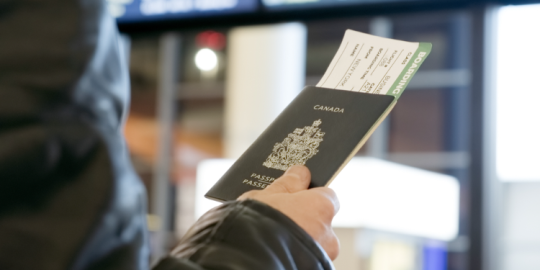Motivations for doing an internship abroad
Catalina is a young Romanian who now lives in Luxembourg. She got a job as a jurist following a law course at a Franco-Romanian university and higher studies in Strasbourg and Paris as part of a research master's and a work-study master's. In 2015, she got the opportunity to chase her dream in Morocco through an internship. Her passion for the Arab culture led her to Casablanca, where she for two years. For her, Morocco was a good compromise in terms of geographical distance and cultural proximity. So at the end of her fixed-term contract, she started applying for internship offers. In four months, she got an offer from the legal department of a bank.
Today, young graduates in Europe can apply for various internship programs, often with a duration of six months to 2 years, that can help them secure a job in the long run. However, they have to meet some criteria in terms of age, skills and criminal record. Pierre, a young French expat in India, mentions a couple more criteria, including good language skills, a degree or diploma in the field you are aiming to work in, and prior work experience.
Pierre has been in India for a year and a half. "I started my studies as a work-study CNC miller. I continued my work-study program in production management at Fives and then at Saint-Gobain in industrial performance. I had my last work-study program at Airbus for a Master 2 in Lean management." However, he was looking to gain work experience in an English-speaking country. "India was far from being my first choice, but the feeling I had about doing an internship abroad took over."
Same goes for Sabine, who is also from France. She was initially looking to gain work experience in South East Asia, and that led her to Indonesia. “I had just graduated from business school. I had also taken part in a university exchange program in Taiwan and performed internships in China in both the public and private sectors." However, due to fierce competition, she was unable to obtain an offer after her studies, despite numerous interviews in the final phase. So she decided to stay in Paris. Fortunately, she got hired by a digital transformation consultancy company, which made her work on many international projects. "I think this experience added value to my CV when I applied again for an internship three years later". Sabine also believes that recruiters are keener on hiring candidates who are flexible, open-minded, curious and have a great interest in foreign cultures.
The challenges of overseas internships
Doing an internship or volunteering abroad obviously has its ups and downs, like in the case of any international relocation. "I first got an offer in Bangkok, but my internship was cancelled before we could sign the contract for financial reasons ", says Sabine. But she didn't give up. She finally received a favourable response from the French Embassy in Jakarta. Indonesia was far from being her dreamland, compared to Vietnam, Singapore and Thailand, but she remained flexible. “Destiny does things pretty well because I am delighted to have spent a year and a half in Indonesia. It's been four months since I returned to France. I'm currently pursuing my career within the Ministry for Europe and Foreign Affairs, in Paris."
Culture shock is another crucial factor to take into account when moving abroad, even in the case of an internship. But for Pierre, this is precisely what makes the mission so rewarding. "Usually, the company and the local colleagues are happy to welcome an expat to the team, so you won't have anything to worry about". Catalina adds that she got the opportunity to observe and gradually adapt to the cultural differences. “My Moroccan colleagues were kind, and my natural curiosity towards their country also played an important role in the communication process. I was able to integrate quite easily, but I discovered a lot of similarities with Romania, my home country."
For Sabine, it's important to avoid sticking with only expat employees and to be interested in the different cultures you're exposed to. "Try to learn the local language or at least the basics. It greatly helps to get by and to communicate daily. My Indonesian colleagues and I were able to communicate easily, so it made it easier for me to adapt ”. Today, many people are contacting Sabine via social networks for internship tips. “I'm aware of how difficult it can be to find an internship abroad, but you have to stay determined despite the refusals. Set up notifications on different websites and apply as soon as possible. Do not waste time. Some recruitment officers only look at the first applications received as they get so many. So keep your CV updated and highlight your personal qualities that would make you the ideal candidate."
How international internships or volunteering can help
International volunteering or internship can go well beyond the simple concept of gaining work experience. Catalina, for example, had the opportunity to prepare the application documents for her company's legal department to take part in a competition to designate the best and most innovative legal departments in Africa -- this project was awarded a Golden Trophy. "This kind of experience is an important proof of a person's adaptability and openness."
For Sabine, doing an internship or volunteering abroad helps you make important persona and professional choices, to see whether we're meant to be an expat, and to reflect on our desires and our limits. “In the end, we turn out more open-minded, being confronted with new cultures, and thanks to our in encounters. We're also able to create strong and long-lasting bonds with the people around us."
Pierre also believes that this experience helped him in many ways, not just professionally. "It's true that I got the chance to occupy a position that would have been impossible for me in France. But I was also able to become fully bilingual, and to learn Hindi."
The impact of the pandemic
The global health crisis has obviously had an impact on international internships, like the rest of the global labour market. However, it affected Pierre's way of working rather than his employment contract. “As we have seven factories spread across India, travel is essential for our organisation. It was hard to work on such projects remotely." Sabine recently returned to France after spending 18 months abroad. “Since I was involved in the consular section, we were naturally mobilised to assist the expats in Indonesia. But in recent months, the embassy has also set up remote work."
















